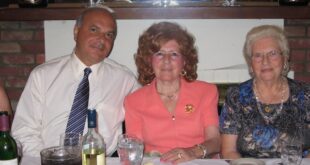You will find recurring themes in my columns: tradition, Dominican University, Italian Americans and unsung heroes. In this particular column, all of the above might apply.
It had been too long since I had savored the early-morning calm at my alma mater Rosary College (now Dominican University) in River Forest. Waiting for Luisa Scala-Buehler to arrive, a veritable floodgate of undergraduate memories opened, as they usually do when I am at Dominican. I try to always take a moment to bask in the glow of epic experiences and magnanimous moments on that campus that would provide the moral compass for the rest of my career … and life. Little did I know that while our paths had never crossed before and 10 long years separated our graduations from Rosary College, mystery writer Luisa Scala-Buehler would share a story that was eerily like my own — complete with an undying gratitude to the Dominican Sisters who, as composites, are characters in her first book, “The Rosary Bride.”

Luisa Scala-Buehler visits with the owners of Luurs Garden & Flower Shoppe in Hillside.
Upon her arrival, Buehler, too, took a few seconds to breathe in the air around the ivied cloister and the quadrangle that first endeared the campus to her. “After my sister-in-law began studying at Rosary, I came here with her. I knew immediately this is where I wanted to go. I went home and told my Italian father that I wanted to go to college and he said simply, “You don’t have to go to college. You’re a girl.”
Her penchant for writing began at two Hillside schools — St. Domitilla Grade School and, although exceedingly proficient in the secretarial program at Proviso West High School, Luisa was hell-bent against following in the footsteps of her classmates and cousins marching off to steno pools and beauty schools. “I knew I was destined for college and this was the only place I wanted to come. I knew somehow that Rosary was the place that would help me evolve past where I knew my life was going to go if I didn’t go to college. In my mind, this is the place I had to be to get to the next level.”
After earning her B.A. in English, Luisa all but assumed the Chicago Sun-Times would promptly hire her and launch writing career. To her surprise, she was promptly assigned to taking classified ads over the phone. She was eventually promoted to outside sales, admitting that, while she fast became a capitalist and pursued a career in sales, she never lost the desire to write — but the short stories and poetry she penned were clearly not enough to pay the bills.
Working full time, Luisa held firm to the lofty idea that one day soon she would leave her job, earn a master’s degree in library science, work in a library and, in due time, buy a bookstore. That chapter of her life as well took an unexpected turn.
When she and her husband, Gerry, excitedly learned they were expecting their first child, Luisa was presented with yet another reality check. “There would be no grad school, no library job and no bookstore — but I am going to write a book,” she pledged to herself.
Taking a day off of work here and there, never disclosing her whereabouts to anyone, Luisa made herself comfortable once again in a place where she had spent hours studying and wondering: the Rosary library. “The book literally began while I was studying for an anatomy test. My mind wandered to the fireplace and I became consumed with why it wasn’t lit. Why isn’t a fire going? Is it stopped up with something? In the end, the skeleton from Anatomy class and my fascination with the fireplace became the foundation for the book. I started writing it in long hand, sitting in the old library in front of that fireplace where, in the book, a body is discovered.”
Filling countless yellow legal pads of paper with ideas related to solving a 50-year old murder mystery, cutting and pasting and scribbling arrows in the margins next to more glued-on notes, Luisa began her book, keeping it to herself to avoid the inevitable nagging question: “How’s the book coming?”
With the advent of the computer, Luisa’s overwhelming compilation of paper resulted in a book that took five years to write — and rewrite — many times over. “Writing is a solitary sport and no one can help you or hear the voices in your head,” Luisa lamented. Crediting the Lisle Library Writer’s Group and the River-Oaks Writer’s Group for breaking her grip on the manuscript she had struggled with and anguished over but hated to let go of, Buehler is grateful for the all-important feedback gained from the groups and still faithfully attends whenever possible, adding Centuries and Sleuths in Forest Park to her list of favorite “haunts.”
A slew of rejection letters prefaced the publishing of “The Rosary Bride — A Cloistered Death” by Echelon Press. At almost the same time, she purchased Widescope Staffing Services in Hillside, where she had worked for 25 years. She has since moved the business to Oakbrook Terrace and changed its name to The Hire Solution, helping people find work in these tough economic times.
Luisa guesses that it was perhaps her years in sales that had thickened her skin against even the harshest handwritten rejection letters. “One woman wrote to me: There’s no need to keep sending this out. The world is not ready for a middle-aged sleuth to solve the problems in a small suburb of Chicago. And I wondered if a hand-written, nasty note was actually more of a compliment than the usual form letter,” queried the author who has since published a total of six books, received the 2008 Lovey Award for “The Inn Keeper: An Unregistered Death,” signed autographs at last year’s Printer’s Row Lit Fest in Chicago (and will participate again this year, first weekend of June), took part in the Oak Park area’s Big Read featuring Edgar Allen Poe and most recently served as a panelist at the three-day Love Is Murder Midwestern Mystery Conference.
Very much in demand, she speaks frequently at libraries, bookstores, senior communities and writer’s groups. This month, she will present a program at an area high school and award one of its students whose short fiction recently won Critic’s Choice honors.
Never to be defined as typical, Luisa defies the first generation Italian-American stereotype; furthermore, she could never be confined to the class of reclusive, chain-smoking, unkempt, wildly gray writers who are never as interesting as one might expect from reading their books.
While she embraces and exudes the Italian language and culture of her childhood mainly through her expressive eyes, she has mastered the English that her father insisted the entire family learn to speak fluently when they moved from Chicago to suburban Berkeley. “Everybody speaks English here,” he proclaimed. “We must fit in and we are going to be Americans!”
And while a printing error in the first edition of her first book lists her alma mater as the fictional Regina College instead of the actual Rosary College, there is no mistaking her written and often-spoken gratitude to Rosary’s Sinsinawa Dominican Sisters. “They are amazing women, consistently a well-spring of optimism and faith. They are distinguished by their thirst for knowledge and profound interest in all things and people. I admire them, I was touched by them and I have to believe I was shaped by them,” professes Buehler.
Her seventh and final book in the series, “The Reenactor: A Staged Death,” will be launched at Forest Park’s Centuries and Sleuths bookstore on July 9, 2011. “It was the summer I was 10 when I hopped on my Schwinn and followed Sharon Buczak to the library located in the basement of the Police Department/Village Hall. That’s where I found Nancy Drew,” Luisa reflects. “Even now, 50 years later, I feel like I have to catch my breath when I think of that moment when I discovered the portal to freedom and imagination.”
For more on Luisa, visit her website at www.luisabuehler.com. For details on the book launch, visit www.centuriesandsleuths.com.
 Fra Noi Embrace Your Inner Italian
Fra Noi Embrace Your Inner Italian





